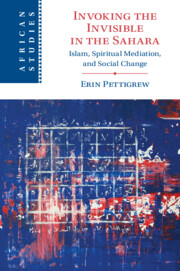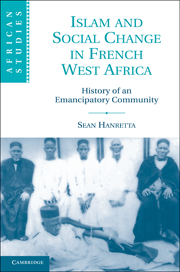Invoking the Invisible in the Sahara
In this innovative new history, Erin Pettigrew utilizes invisible forces and entities - esoteric knowledge and spirits - to show how these forms of knowledge and unseen forces have shaped social structures, religious norms, and political power in the Saharan West. Situating this ethnographic history in what became la Mauritanie under French colonial rule and, later the Islamic Republic of Mauritania, Pettigrew traces the changing roles of Muslim spiritual mediators and their Islamic esoteric sciences - known locally as l'ḥjāb - over the long-term history of the region. By exploring the impact of the immaterial in the material world and demonstrating the importance of Islamic esoteric sciences in Saharan societies, she illuminates peoples' enduring reliance upon these sciences in their daily lives and argues for a new approach to historical research that takes the immaterial seriously.
- Explores the history of Islam, race-making, and gender over the precolonial, colonial, and postcolonial periods in the Saharan West
- Incorporates the immaterial world in the telling of Mauritanian history, showing how spirits and invisible forces shaped the region in concrete ways
- Employs an interdisciplinary approach that combines history and anthropology, providing a model for historical narratives that use anthropological methods
Reviews & endorsements
‘Invoking the Invisible in the Sahara situates battles over the meaning and control of Islamic esoteric knowledge (ḥjāb) in Mauritania's history of racial and political struggles dating to the pre-colonial era. Innovatively using contemporary social media alongside traditional textual and oral sources, Pettigrew reveals the resilience and adaptability of both ḥjāb power and practitioners. ‘Magic' in Mauritania has not disappeared; it has become a marketable commodity.' Ann McDougall, University of Alberta
‘Combining methodological rigor with conceptual dexterity, this empirically rich, multilayered historical ethnography of l'hjab in the Saharan West documents how often-unseen forces and entities shape history, social structure, religious norms, and political power. This scintillating book ultimately reorients our understanding of the so-called Islamic esoteric sciences.' Zekeria Ahmed Salem, Northwestern University
‘Erin Pettigrew's monograph offers a fresh interpretation of Islam and societal life in the Saharan West. Replacing local histories of Muslim esoteric sciences within the various cultural and social contexts that nurtured them, the author masterfully challenges notions of marginality and periphery in Islamic studies and African history.' Ismail Warscheid, Centre National de la Recherche Scientifique
‘Erin Pettigrew combines extensive anthropological field research with a meticulous documentary investigation and gives, along the way … a beautiful lesson in historical anthropology.’ Abdel Wedoud Ould Cheikh, L’Homme. Revue française d’anthropologie
Product details
September 2024Paperback
9781009224567
368 pages
228 × 151 × 20 mm
0.54kg
Available
Table of Contents
- Introduction: a Saharan ontology of the invisible
- 1. Principles of provenance: origins, debates, and social structures of l'ḥjāb in the Saharan West
- 2. Local wisdom: contestations over l'ḥjāb in the 18th-19th centuries
- 3. Colonial logics of Islam: managing the threat of l'ḥjāb
- 4. Postcolonial transfigurations: contesting l'ḥjāb in the era of social media
- 5. Desert panic: bloodsucking accusations and the terror of social change
- 6. Sui generis: genealogical claims to the past and the transmission of l'ḥjāb
- Epilogue.









